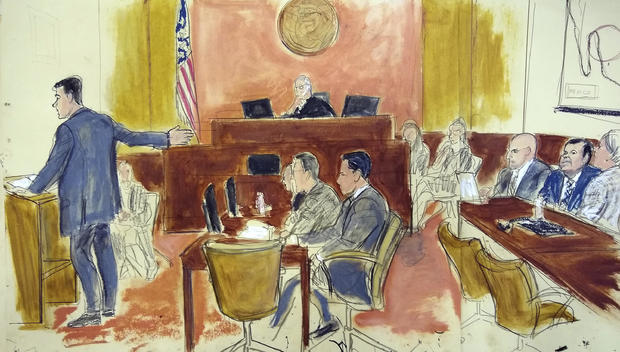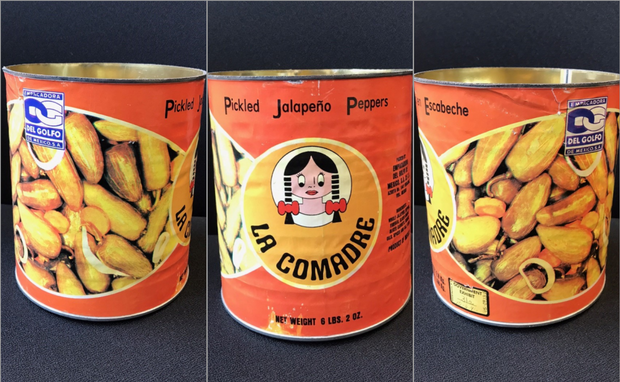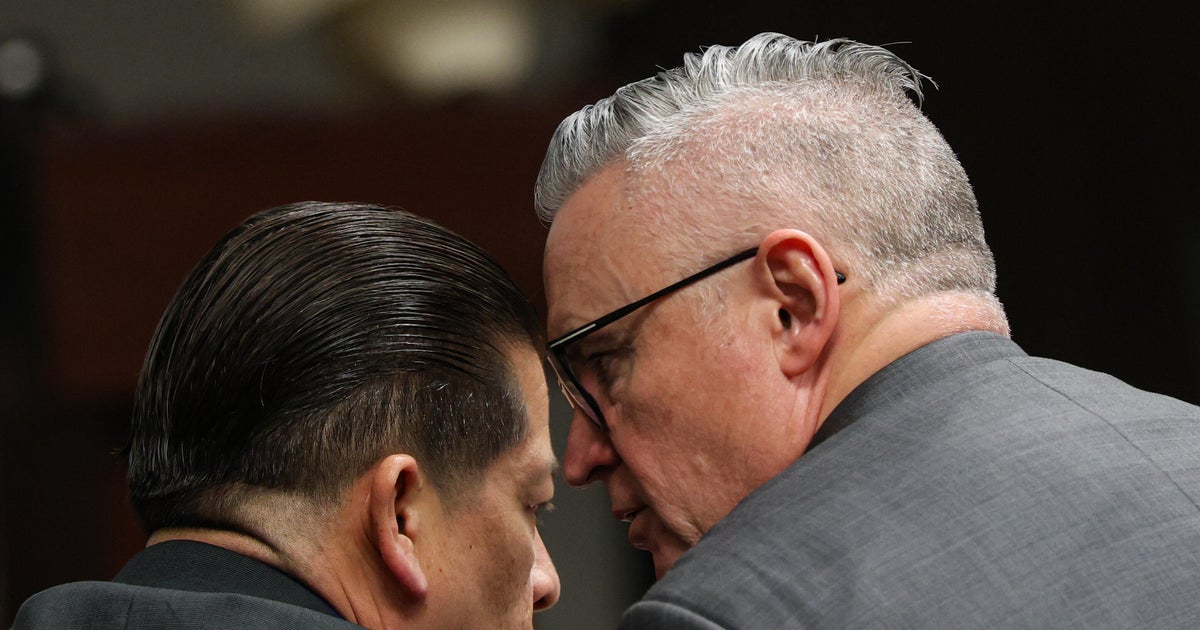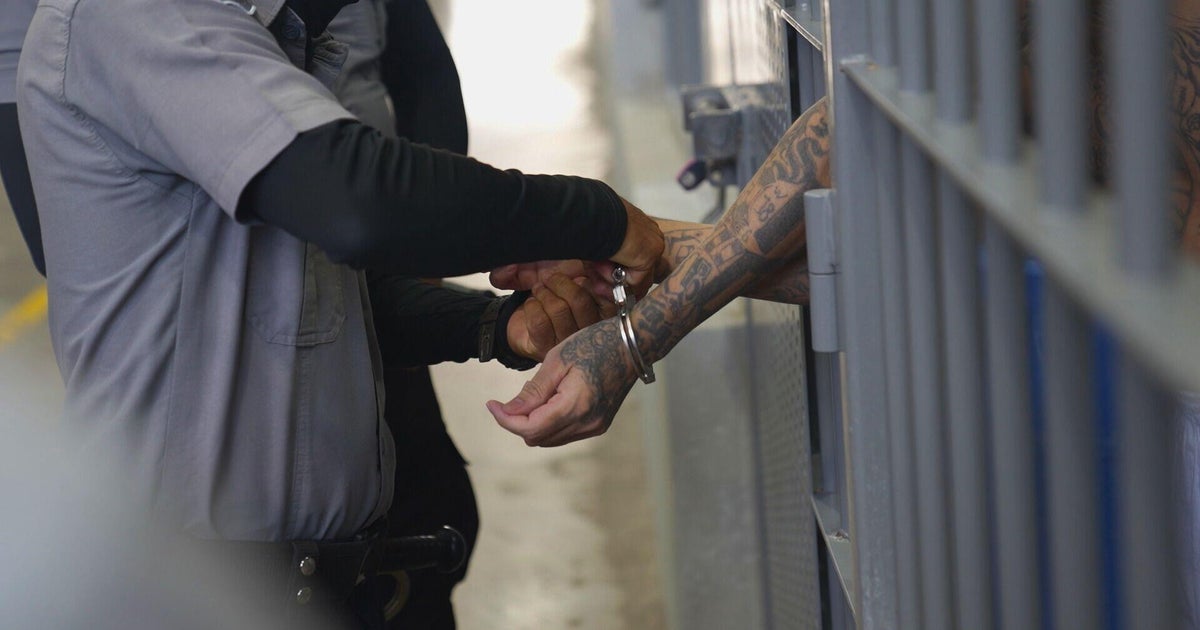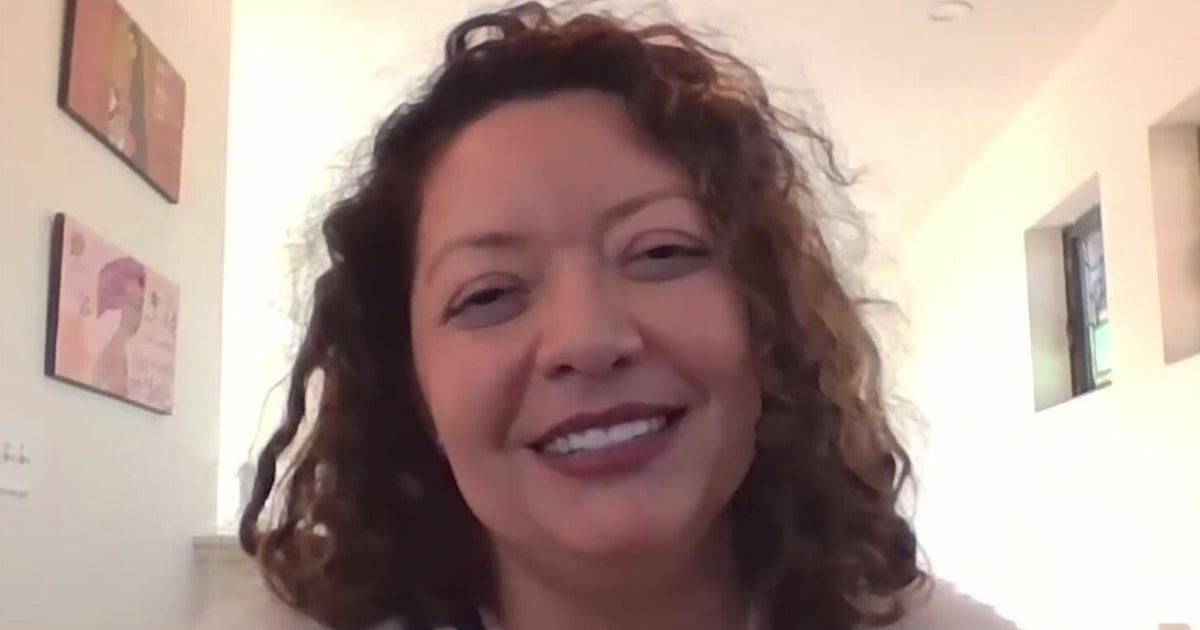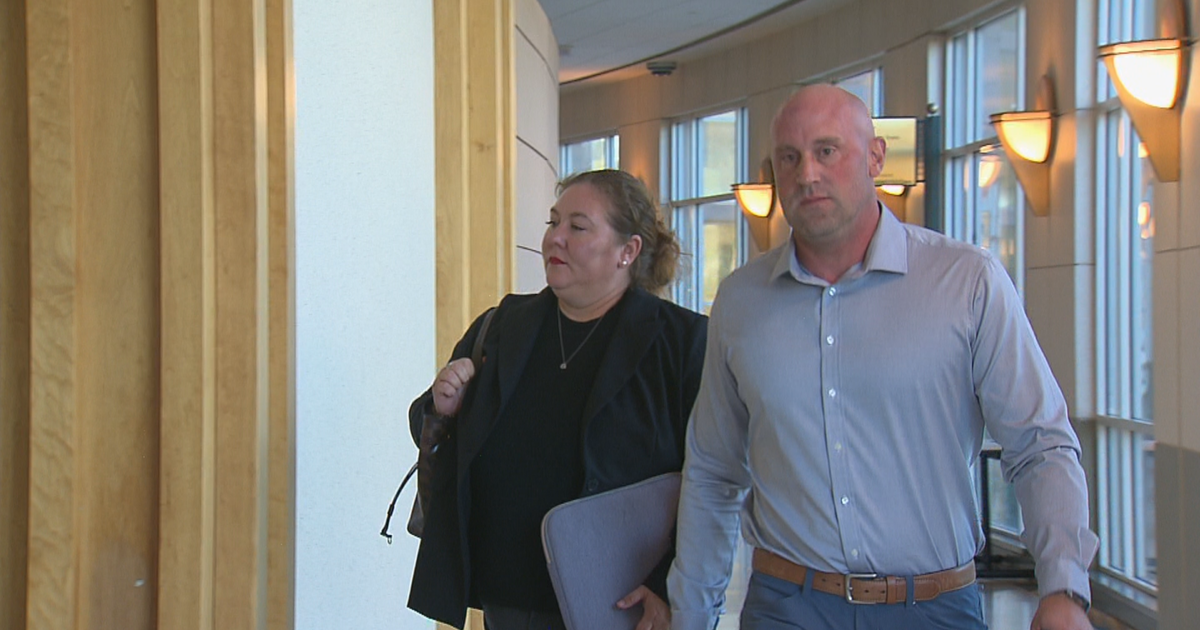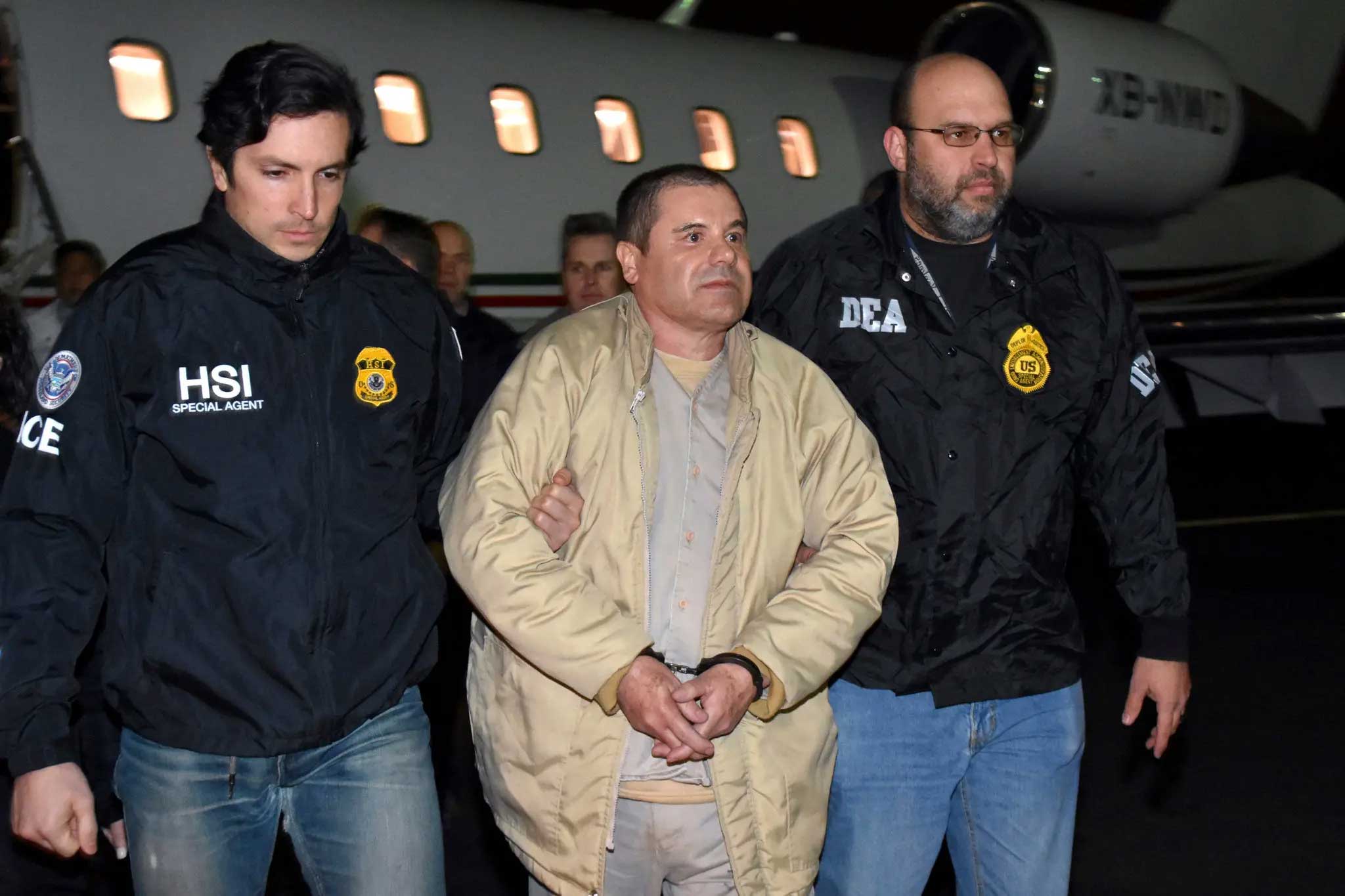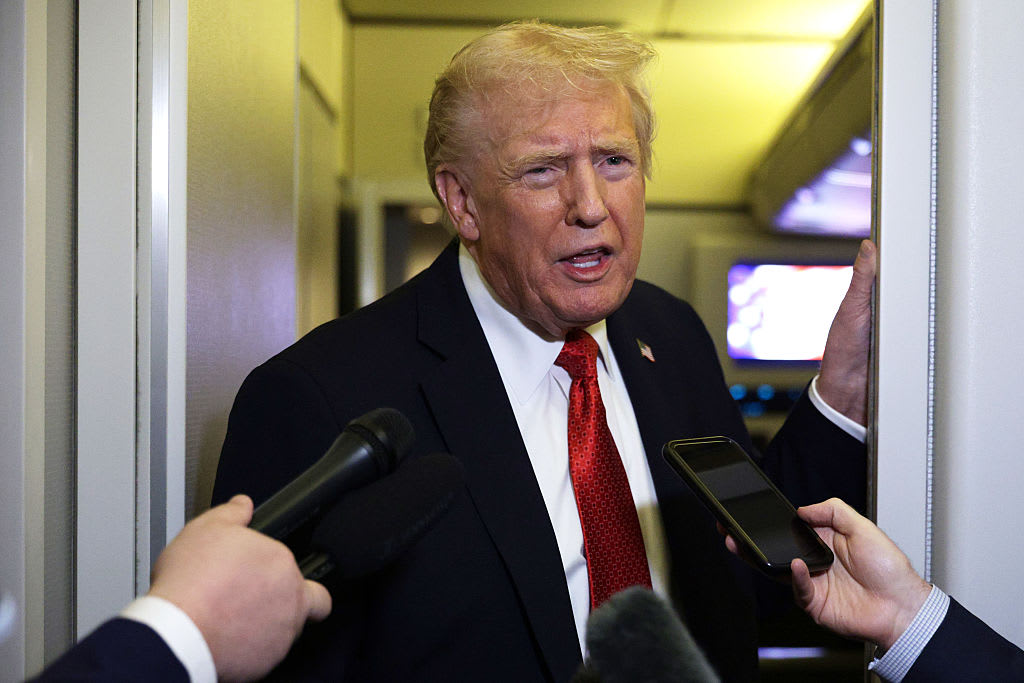"El Chapo" Guzman's defense attorneys try to paint lieutenant-turned-witness as having vendetta
Jurors in Mexican drug lord Joaquin "El Chapo" Guzman listened Wednesday to the third day of testimony from witness Miguel Angel Martinez, Guzman's former cartel lieutenant who defense attorneys tried to paint as a man with a vendetta against Guzman. Martinez, known as "El Gordo," blamed Guzman for four attempts on his life while he was serving time in a Mexican jail.
The tensest moment, even from the overflow courtroom, came when Guzman's defense team asked Martinez whether he had grown to hate his former boss, who could spend the rest of his life inside a U.S. federal prison.
"You lied because you hate the man right there, right?" boomed defense attorney William Purpura. "You lied to this jury because you hate the man."
Martinez answered "I hate Mr. Guzman, yes."
Martinez told the court about his arrest on June 8, 1998. He was charged with "conspiracy of sending drugs to the United States." He spent more than three years inside Mexican prisons until he was extradited to the U.S. in 2001.
He fought that extradition. He said he also tried bribery, "I told my attorney to offer money to one of the judges." But the offer of $500,000 didn't work. He explained it obviously wasn't effective because "I wouldn't be up here."
Robotti asked him about his initial meeting with federal investigators, and whether he was "truthful about your past crimes." Martinez said no and explained he opted to "remain silent until I had an attorney" but began cooperating later that year "because I had to tell the truth."
Martinez is not a U.S. citizen, but he is inside the country legally because he has "continued to cooperate with the government. He has applied for his permanent residence.
Robotti asked Martinez what it means to cooperate with the government. "To tell the truth," Martinez replied.
Martinez has testified in other cases, including before a grand jury in San Diego in 2002, a trial in Arizona in 2006 – and he's prepared to testify in others. He said his cooperation has been going on for 18 years.
Martinez served six years in a U.S. prison and was released in 2007 after "prosecutors made a request."
Robotti asked Martinez what the benefits of cooperating are. He said he received documents to work, the government "helped me in the beginning financially, estimating he had received "around $30,000" from the government since he left prison. In fact, Martinez said he's being paid to travel to Brooklyn for this trial and his housing is also covered. He had been working regularly but recently lost that job due to an "accident." Martinez even lived in government housing and was confronted for smoking inside. He denied it and told the courtroom he lied about the ordeal because he was "afraid they would kick me out of the program."
Martinez said he is under the care of a psychologist because he can't sleep and has anxiety. But he insisted it does not affect his memory.
Martinez said he did not want to testify in Guzman's case for "safety" reasons, but he was subpoenaed. He has been cooperating for 18 months with "20-30" meetings with the government to prepare. But he still didn't want to participate in the trial against Guzman.
Martinez said he was diligent while Guzman was behind bars. He said he "never failed him, I never stole or betrayed him, I watched over his family. And the only thing I ever received from him was four attempted attacks against me."
Guzman was arrested in June 1993. Martinez said Guzman handed out orders from that Mexican jail or would "call me to tell me something."
Martinez said that one time Guzman "asked me about one of his planes," a Grumman 4 business jet, loaned to Amado Carrillo, who sent the plane to Colombia and "sent it back with cocaine."
Martinez testified the plane had been seized 8 months earlier, but Guzman was not aware since he was in the dark from behind bars. Explaining the situation in code, telling him a combination of "little car" and "Amanda" — Martinez told the jury he was relaying a reference to "Amado Carrillo."
He then noted how that aircraft cost Guzman "$3.5 million" and was a necessary tool for the cartel since "it has a range…from 9 to 10 hours…" and the pilot was sent "directly to Colombia" and had "a big enough range to get to Mexico City."
Martinez had agreed to take care of Guzman's wives and children and obtained the rights to Guzman's properties and handled select business dealings. Guzman's brother Arturo largely took over. "It was very difficult for me to work for two people," Martinez explained.
Jurors then heard audio from a Sept. 1, 1994 phone call Martinez held with Enrique "The Doctor" Avalos, who was the Cartel's main guy in the U.S. Avalos is now serving a life sentence in California.
The court heard a translation of a phone call where Martinez told Avalos he sent his "s--- over to the border."
Martinez said that when Guzman was arrested, he had 3,500 kilos of cocaine. He explained that Guzman's brother Arturo "took possession of those things" and Martinez "actually sent those things by train for him… and he didn't even thank me."
District Judge Brian Cogan quietly swiveled in his chair, listening to the audio of the next series of calls.
The 12 jurors and 6 alternates heard the witness talking on the phone to Avalos, discussing plots of land they had their eye on, perfect for tunnels under the Mexican border with the U.S. When Robotti asked who the tunnel belonged to, Martinez replied "Mr. Joaquin Guzman."
Guzman, sitting across the room, took notes and spoke to his attorney, Eduardo Balarezo.
Martinez said the "American police in Los Angeles" arrested Avalos by 1995. Because of that, Guzman called Martinez to find someone inside the U.S. to kill "The Doctor" since "Avalos was talking, he was cooperating with the police."
Martinez said he did not listen to the message from El Chapo. "I never killed anyone. I never killed anyone." He said there was "no way" he had any ability to carry out the request.
"Guzman had paid me $1 million and with that, I was making payments to his attorneys," Martinez said.
He was also helping Guzman's families, "providing them with everything they needed." But Martinez said he was short on cash after his 1998 arrest and eventually had to start selling properties, including one where Guzman's wife Griselda lived with their children, from 1993-1998. He said "she was upset." It sold for $250,000.
The first attempt on his life happened "two months later." In fact, Martinez explained, it was "15 days" after Guzman's attorneys visited him behind bars to sign the properties out of his name back into Guzman's.
Martinez said that first attack happened in 1998, in a Mexican jail cell. He said three men stabbed him a total of seven times. He suffered a perforated lung and an intestine with a similar wound.
Martinez said he was "sent to the hospital, dying." The attackers used "knives, blades and a bat." But when asked about what happened to the bat, Martinez called it "incredible," saying that when he put his hand up to defend himself, "the bat broke."
He was returned to the same jail cell after 15 days in the hospital. He heard his attackers "polishing their blades" and three months later, he was attacked in a similar fashion, this time stabbed "five or six times" in his back. His pancreas and his lung were perforated.
After the second attack, Martinez said he was sent to a new jail in Mexico City. He had been there before. On Tuesday, he talked about visiting "El Azul" with Guzman inside of that building.
He said the inmates were ruthless, yelling at him, "asking me what my shoe size was… because I was already dead." He explained that means they wanted to keep his shoes for themselves.
Martinez said he was eventually attacked there. He said they stabbed me "all over my face." A guard intervened, stopping the attack.
From there, Martinez said he was moved into isolation.
On the night before the fourth and final attempt on his life, in 2000, Martinez said he could hear a "wind band playing." Their music was so loud, he could hear it coming from outside the jail.
He recognized the song, it was a "corrido" — a genre introduced by the prosecution on Tuesday as a custom song Guzman had been known to pay handsomely for.
"He would play it a lot," Martinez said.
When the prosecution asked what the song "Un Puno De Tierra" meant and why Guzman liked it, Martinez explained it was a message "to live your life intensely," meaning the "only thing you take with you when you leave is a bunch of soil."
He said he heard the song "about 20 times" that night.
"About two hours" later that morning, Martinez said he was the victim of a double grenade attack. The assailant held a gun to a guard's head and said "the problem is not with you, it is with that guy." Martinez said he threw himself back before the grenades exploded and was not injured.
With that, the witness was turned over to the defense for cross examination.
The defense team worked quickly to expose Martinez as someone who used to bring bootleg television sets from the U.S. into Mexico and had no prior drug trafficking experience. They were also able get Martinez to admit rather quickly that he is a cocaine addict and an alcoholic.
The defense attorney, Purpura, asked personal questions to dig into "the illness portion" of his life. When Martinez told the translator he didn't understand the question, Purpura snapped back how "that was the polite way to say you were a drug addict." Martinez agreed that he was, saying he had a "four gram-a day habit for 15 years, starting in 1983."
The defense team brought props. Purpura presented a Splenda sugar packet, saying its content equaled one gram – "that in itself is a lot."
When he opened the packet and prepared to dump it on the project, the judge, Cogan, said "don't ruin our machines."
Purprua then did the math – out loud – saying "365 days times four grams equals 1,460 grams of cocaine." A kilo is 1,000 grams of cocaine.
That means Martinez, who then admits he has been to rehab, used to ingest close to a kilo and-a-half every year.
Purpura asked a series of rapid-fire questions related ot if his extensive use could cause brain damage, including hallucinations and schizophrenia. Martinez answered yes to all these questions.
Purpura said Martinez's use was so extensive he "literally had to have your septum replaced with cartilage from another place in your body?" Martinez said yes. "Your nose didn't actually fall off?" Purpura said.
With this knowledge, Purpura showed the jury his skepticism when it came to the details Martinez revealed about the attempts on his life.
"Two grenades were released in an enclosed area and nobody was injured?" Purpura asked sarcastically.
The witness told him he was correct but didn't know whether there was ever any media coverage of the attack.
After Martinez told the jury again how he was stabbed "three times" before that grenade assault, Purpura cited his previous testimony as a cooperating witness. He confronted Martinez with what he said under oath in 2002, about the number of times he was stabbed: "it was two different occasions, each one was eight, eight stabbings."
Purpura questioned the details Martinez shared under oath on Tuesday about what he saw alongside Guzman, who took him to a party inside a jail "in the early part of 1987" to visit El Azul.
"Within 90 days of meeting him, he takes you to a prison, to meet as you described, the boss of all bosses? It seems almost silly." Purpura mentioned "lobster and beef" and whether there was "brandy and alcohol."
Purpura also questioned Martinez's second-hand account of the assassination of Juan Jesús Posadas Ocampo in May 1993. How did he find out the details? "I don't remember if it was Mr. Guzman or his bodyguard," Martinez answered.
Then Purpura asked, "How many people were shooting?" Martinez doesn't know. The attorney asks whether the assailants used automatic weapons and Martinez replies, "I wasn't there." With a surprised tone, Purpura replies, "no one told you that, either?"
When Purpura asked if investigators played recordings of his phone calls, Martinez said "I don't remember."
"Did they offer to play tapes and you said you read the transcripts while incarcerated?" Purpura asked. Martinez said he didn't remember.
When Martinez testified in the Arizona case in March 2006, he was asked by that government counsel why Guzman would want to kill him. Purpura read his testimony where he said on the record, "the truth is, I don't know."
Martinez replied Wednesday that "I didn't know."
Purpura said quietly "very good."
"I started hating Mr. Guzman when he betrayed me," Martinez insists. And with that, the defense attorney asked Martinez whether he hates Guzman "enough to lie about him?"
The defense pinpointed other times Martinez's prior testimony did not line up with what he said this week.
Purpura reminded the jury how Martinez, "specifically said yesterday that El Chapo ordered murders," in his March 2006 testimony, Martinez had said the opposite.
Court resumes Thursday at 9:30 a.m.
